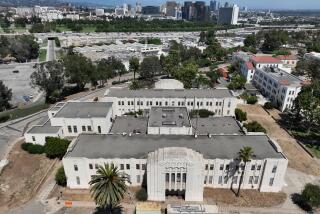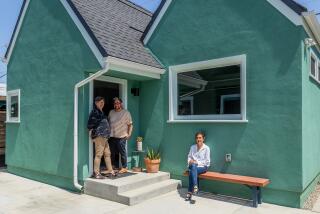A Special Home
FULLERTON — At 71, Jean Sandhorst had expected the complexities of life to be well behind her by now as she and her 72-year-old husband, Don, settled into retirement. Instead, the San Jacinto couple is consumed with caring for their son, John, who suffered a severe brain injury in a car accident 20 years ago.
John is 36, and the accident left him beset with behavioral problems. His ability to reason is hampered by the injury, and he’s been in various hospitals and programs. But the Sandhorsts have been unable to find him a permanent home.
“We have been 20 years trying to rehabilitate him so he can live independently, so he has the chance to become more developed and have the highest quality of life, instead of living day by day,” Jean Sandhorst said.
The Sandhorsts, weary of the constant care their son needs, hope John will be among those chosen to live in California’s first low-income housing for the physically disabled that offers 24-hour care. It is now under construction in Fullerton.
The 25-unit Harbor View Terrace complex will be available this summer to those who have brain injuries, are blind, hearing-impaired, use wheelchairs or have other physical disabilities.
The project, at 2305 N. Harbor Blvd., costs nearly $3 million and is being funded primarily through a $2.4-million grant from the Department of Housing and Urban Development. Other than a $75,000 award from the Federal Home Loan Bank of San Francisco, the rest of the money is being raised privately.
The Fullerton Redevelopment Agency conducted a study several years ago to determine what types of affordable housing were needed. Homes for the physically challenged were at the top of that list, said Gary Chalupsky, the redevelopment agency’s executive director.
“In the past, they [physically disabled] could be totally institutionalized or live at home,” Chalupsky said. “Now they will have other choices. . . . It’s kind of a whole [new] level of dignity to be able to have your own apartment.”
When completed, Harbor View Terrace will be two stories with a furnished courtyard and outdoor recreation areas.
The complex will be nestled in a neighborhood of single-family homes on a site less than a block from St. Jude Medical Center.
“It’s quite a nice area and should be a good place to live,” said Mary Fellows, president of the House of Triumph, a Fullerton-based nonprofit organization formed by the parents of physically challenged adult children.
“I think what everybody hopes is to live an independent life . . . not to have to live with parents all their lives,” Fellows said. “For some people, it might be that they can move out of the nursing home.”
The Fullerton complex will offer one-bedroom units, each 552 square feet, and two-bedroom units, each 800 square feet. They will be designed with lowered countertops, wide doorways, wide hallways, ramps and elevators.
Some units for the hearing-impaired will be equipped with flashing lights instead of fire alarms with sound.
At least one counselor will live at Harbor View Terrace. Staff members, provided by funds through the House of Triumph, will help residents find jobs and advise them about hiring caregivers. The staff also will help residents learn about transportation routes and find shopping and recreation spots.
“They will finally get their apartment, and they’re making it on their own,” Fellows said. “We are going to be a resource to help them get plugged into community services that already exist.”
The Harbor View Terrace development is being jointly sponsored by the House of Triumph and Accessible Space Inc., another nonprofit organization based in St. Paul, Minn.
Stephen Vander Schaaf, president of Accessible Space, said his nationwide organization has been involved in 40 such projects in 15 states since 1978 and called the Fullerton complex a “model that has been time-tested.”
Said Vander Schaaf: “If we can give them access to safe, accessible and affordable housing and provide them with care choices, then they can work on returning to the society in terms of education [and] employment.”
In compliance with federal policies, project administrators won’t begin accepting applications for residency until three months prior to completion of the project. Requirements will be that applicants are disabled and make roughly less than $18,000 annually.
The Sandhorsts hope their son meets all those requirements.
“We’re getting up in age, and it is becoming very difficult for us,” Jean Sandhorst said. “We need to find a facility that will be able to give him the independence that he deserves.”
More to Read
Sign up for Essential California
The most important California stories and recommendations in your inbox every morning.
You may occasionally receive promotional content from the Los Angeles Times.










